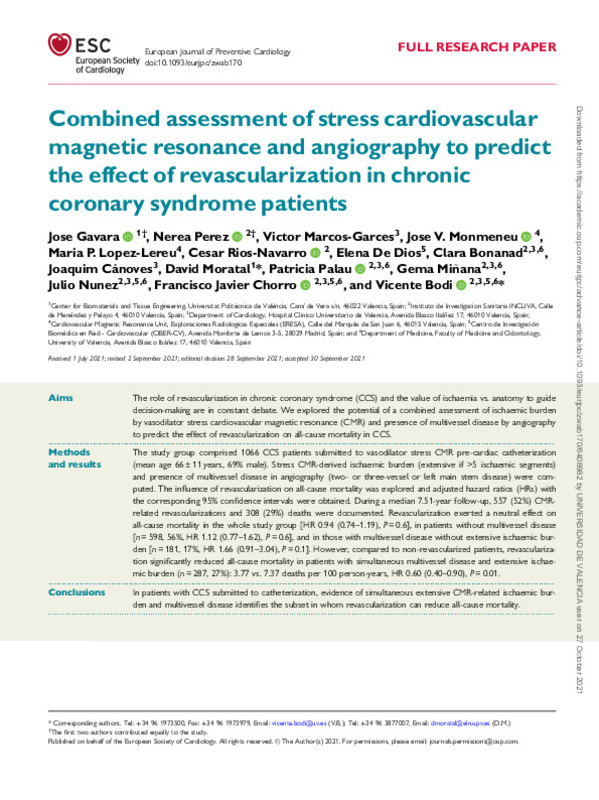JavaScript is disabled for your browser. Some features of this site may not work without it.
Buscar en RiuNet
Listar
Mi cuenta
Estadísticas
Ayuda RiuNet
Admin. UPV
Combined assessment of stress cardiovascular magnetic resonance and angiography to predict the effect of revascularization in chronic coronary syndrome patients
Mostrar el registro completo del ítem
Gavara-Doñate, J.; Pérez, N.; Marcos-Garces, V.; Monmeneu, JV.; Lopez-Lereu, MP.; Rios-Navarro, C.; De Dios, E.... (2022). Combined assessment of stress cardiovascular magnetic resonance and angiography to predict the effect of revascularization in chronic coronary syndrome patients. European Journal of Preventive Cardiology. 29(2):407-416. https://doi.org/10.1093/eurjpc/zwab170
Por favor, use este identificador para citar o enlazar este ítem: http://hdl.handle.net/10251/199841
Ficheros en el ítem
Metadatos del ítem
| Título: | Combined assessment of stress cardiovascular magnetic resonance and angiography to predict the effect of revascularization in chronic coronary syndrome patients | |
| Autor: | Pérez, Nerea Marcos-Garces, Victor Monmeneu, José V. Lopez-Lereu, Maria P. Rios-Navarro, César De Dios, Elena Bonanad, Clara Canoves, Joaquim Palau, Patricia Miñana, Gema Nunez, Julio Chorro, Francisco Javier Bodi, Vicente | |
| Entidad UPV: |
|
|
| Fecha difusión: |
|
|
| Resumen: |
[EN] Aims The role of revascularization in chronic coronary syndrome (CCS) and the value of ischaemia vs. anatomy to guide decision-making are in constant debate. We explored the potential of a combined assessment of ...[+]
|
|
| Palabras clave: |
|
|
| Derechos de uso: | Reserva de todos los derechos | |
| Fuente: |
|
|
| DOI: |
|
|
| Editorial: |
|
|
| Versión del editor: | https://doi.org/10.1093/eurjpc/zwab170 | |
| Código del Proyecto: |
...[+] |
|
| Agradecimientos: |
This work was supported by the Instituto de Salud Carlos III and co-funded by Fondo Europeo de Desarrollo Regional (FEDER) (PI20/00637 and CIBERCV16/11/00486) and by Sociedad Espanola de Cardiologia (SEC/FEC-INV-CLI 21/024). ...[+]
|
|
| Tipo: |
|









